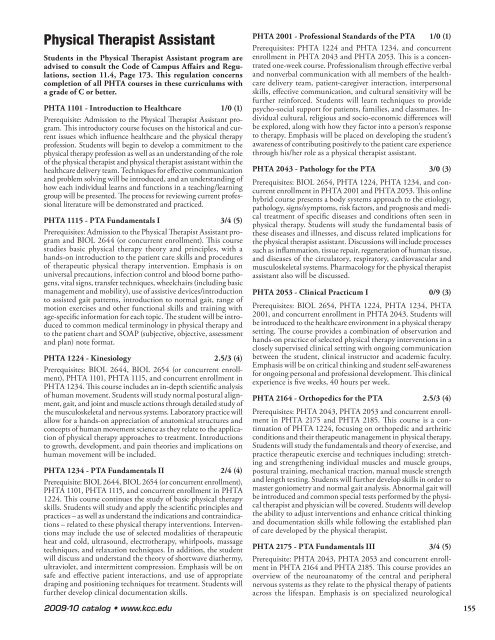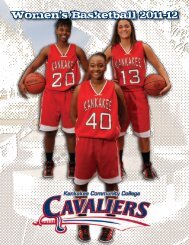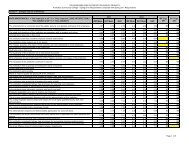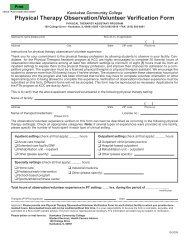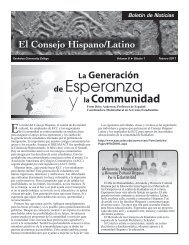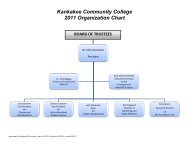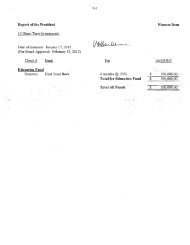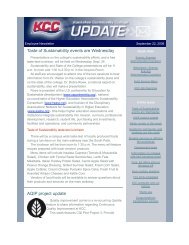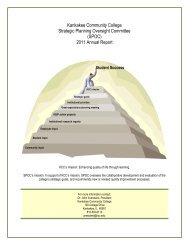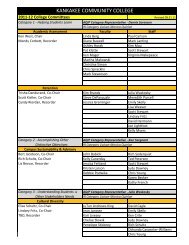09-10_Academiccatalog(Fullcatalog4.30mb) - Kankakee ...
09-10_Academiccatalog(Fullcatalog4.30mb) - Kankakee ...
09-10_Academiccatalog(Fullcatalog4.30mb) - Kankakee ...
You also want an ePaper? Increase the reach of your titles
YUMPU automatically turns print PDFs into web optimized ePapers that Google loves.
Physical Therapist Assistant<br />
Students in the Physical Therapist Assistant program are<br />
advised to consult the Code of Campus Affairs and Regulations,<br />
section 11.4, Page 173. This regulation concerns<br />
completion of all PHTA courses in these curriculums with<br />
a grade of C or better.<br />
PHTA 1<strong>10</strong>1 - Introduction to Healthcare 1/0 (1)<br />
Prerequisite: Admission to the Physical Therapist Assistant program.<br />
This introductory course focuses on the historical and current<br />
issues which influence healthcare and the physical therapy<br />
profession. Students will begin to develop a commitment to the<br />
physical therapy profession as well as an understanding of the role<br />
of the physical therapist and physical therapist assistant within the<br />
healthcare delivery team. Techniques for effective communication<br />
and problem solving will be introduced, and an understanding of<br />
how each individual learns and functions in a teaching/learning<br />
group will be presented. The process for reviewing current professional<br />
literature will be demonstrated and practiced.<br />
PHTA 1115 - PTA Fundamentals I 3/4 (5)<br />
Prerequisites: Admission to the Physical Therapist Assistant program<br />
and BIOL 2644 (or concurrent enrollment). This course<br />
studies basic physical therapy theory and principles, with a<br />
hands-on introduction to the patient care skills and procedures<br />
of therapeutic physical therapy intervention. Emphasis is on<br />
universal precautions, infection control and blood borne pathogens,<br />
vital signs, transfer techniques, wheelchairs (including basic<br />
management and mobility), use of assistive devices/introduction<br />
to assisted gait patterns, introduction to normal gait, range of<br />
motion exercises and other functional skills and training with<br />
age-specific information for each topic. The student will be introduced<br />
to common medical terminology in physical therapy and<br />
to the patient chart and SOAP (subjective, objective, assessment<br />
and plan) note format.<br />
PHTA 1224 - Kinesiology 2.5/3 (4)<br />
Prerequisites: BIOL 2644, BIOL 2654 (or concurrent enrollment),<br />
PHTA 1<strong>10</strong>1, PHTA 1115, and concurrent enrollment in<br />
PHTA 1234. This course includes an in-depth scientific analysis<br />
of human movement. Students will study normal postural alignment,<br />
gait, and joint and muscle actions through detailed study of<br />
the musculoskeletal and nervous systems. Laboratory practice will<br />
allow for a hands-on appreciation of anatomical structures and<br />
concepts of human movement science as they relate to the application<br />
of physical therapy approaches to treatment. Introductions<br />
to growth, development, and pain theories and implications on<br />
human movement will be included.<br />
PHTA 1234 - PTA Fundamentals II 2/4 (4)<br />
Prerequisite: BIOL 2644, BIOL 2654 (or concurrent enrollment),<br />
PHTA 1<strong>10</strong>1, PHTA 1115, and concurrent enrollment in PHTA<br />
1224. This course continues the study of basic physical therapy<br />
skills. Students will study and apply the scientific principles and<br />
practices – as well as understand the indications and contraindications<br />
– related to these physical therapy interventions. Interventions<br />
may include the use of selected modalities of therapeutic<br />
heat and cold, ultrasound, electrotherapy, whirlpools, massage<br />
techniques, and relaxation techniques. In addition, the student<br />
will discuss and understand the theory of shortwave diathermy,<br />
ultraviolet, and intermittent compression. Emphasis will be on<br />
safe and effective patient interactions, and use of appropriate<br />
draping and positioning techniques for treatment. Students will<br />
further develop clinical documentation skills.<br />
PHTA 2001 - Professional Standards of the PTA 1/0 (1)<br />
Prerequisites: PHTA 1224 and PHTA 1234, and concurrent<br />
enrollment in PHTA 2043 and PHTA 2053. This is a concentrated<br />
one-week course. Professionalism through effective verbal<br />
and nonverbal communication with all members of the healthcare<br />
delivery team, patient-caregiver interaction, interpersonal<br />
skills, effective communication, and cultural sensitivity will be<br />
further reinforced. Students will learn techniques to provide<br />
psycho-social support for patients, families, and classmates. Individual<br />
cultural, religious and socio-economic differences will<br />
be explored, along with how they factor into a person’s response<br />
to therapy. Emphasis will be placed on developing the student’s<br />
awareness of contributing positively to the patient care experience<br />
through his/her role as a physical therapist assistant.<br />
PHTA 2043 - Pathology for the PTA 3/0 (3)<br />
Prerequisites: BIOL 2654, PHTA 1224, PHTA 1234, and concurrent<br />
enrollment in PHTA 2001 and PHTA 2053. This online<br />
hybrid course presents a body systems approach to the etiology,<br />
pathology, signs/symptoms, risk factors, and prognosis and medical<br />
treatment of specific diseases and conditions often seen in<br />
physical therapy. Students will study the fundamental basis of<br />
these diseases and illnesses, and discuss related implications for<br />
the physical therapist assistant. Discussions will include processes<br />
such as inflammation, tissue repair, regeneration of human tissue,<br />
and diseases of the circulatory, respiratory, cardiovascular and<br />
musculoskeletal systems. Pharmacology for the physical therapist<br />
assistant also will be discussed.<br />
PHTA 2053 - Clinical Practicum I 0/9 (3)<br />
Prerequisites: BIOL 2654, PHTA 1224, PHTA 1234, PHTA<br />
2001, and concurrent enrollment in PHTA 2043. Students will<br />
be introduced to the healthcare environment in a physical therapy<br />
setting. The course provides a combination of observation and<br />
hands-on practice of selected physical therapy interventions in a<br />
closely supervised clinical setting with ongoing communication<br />
between the student, clinical instructor and academic faculty.<br />
Emphasis will be on critical thinking and student self-awareness<br />
for ongoing personal and professional development. This clinical<br />
experience is five weeks, 40 hours per week.<br />
PHTA 2164 - Orthopedics for the PTA 2.5/3 (4)<br />
Prerequisites: PHTA 2043, PHTA 2053 and concurrent enrollment<br />
in PHTA 2175 and PHTA 2185. This course is a continuation<br />
of PHTA 1224, focusing on orthopedic and arthritic<br />
conditions and their therapeutic management in physical therapy.<br />
Students will study the fundamentals and theory of exercise, and<br />
practice therapeutic exercise and techniques including: stretching<br />
and strengthening individual muscles and muscle groups,<br />
postural training, mechanical traction, manual muscle strength<br />
and length testing. Students will further develop skills in order to<br />
master goniometry and normal gait analysis. Abnormal gait will<br />
be introduced and common special tests performed by the physical<br />
therapist and physician will be covered. Students will develop<br />
the ability to adjust interventions and enhance critical thinking<br />
and documentation skills while following the established plan<br />
of care developed by the physical therapist.<br />
PHTA 2175 - PTA Fundamentals III 3/4 (5)<br />
Prerequisite: PHTA 2043, PHTA 2053 and concurrent enrollment<br />
in PHTA 2164 and PHTA 2185. This course provides an<br />
overview of the neuroanatomy of the central and peripheral<br />
nervous systems as they relate to the physical therapy of patients<br />
across the lifespan. Emphasis is on specialized neurological<br />
20<strong>09</strong>-<strong>10</strong> catalog • www.kcc.edu<br />
155


